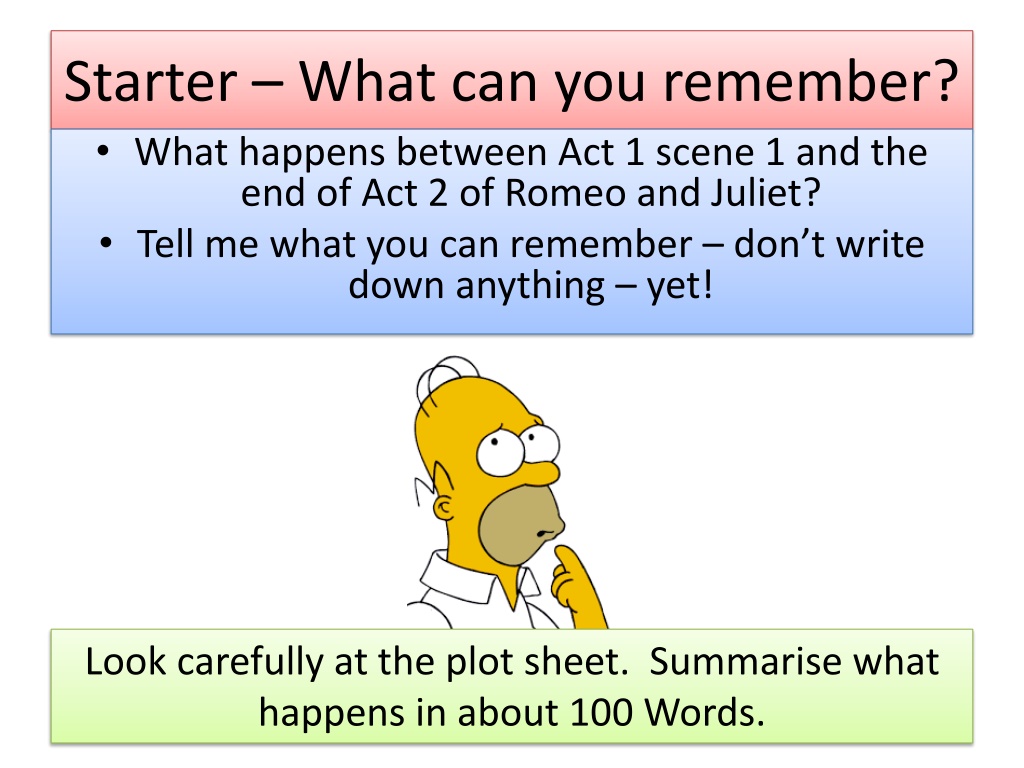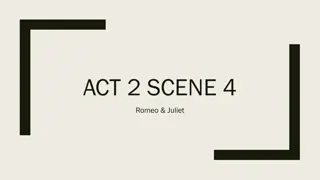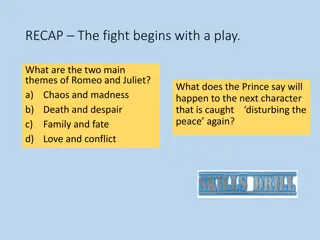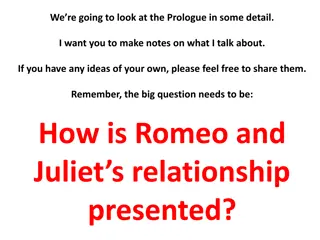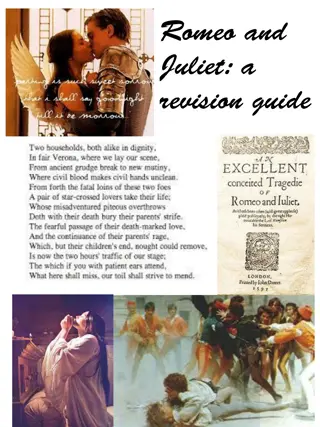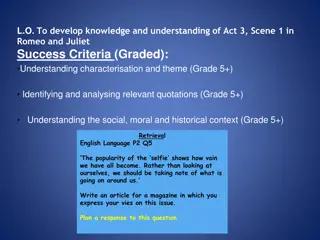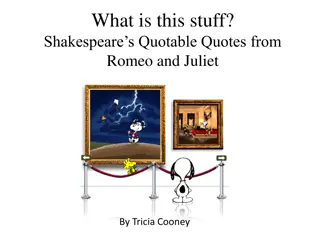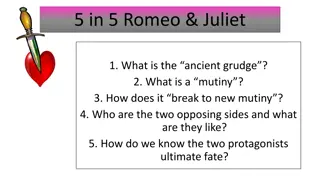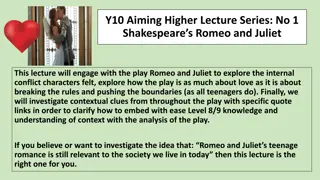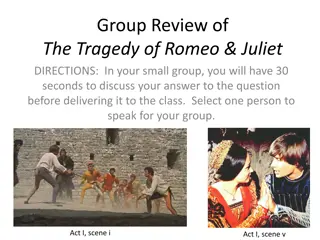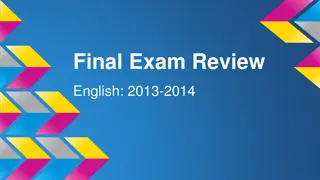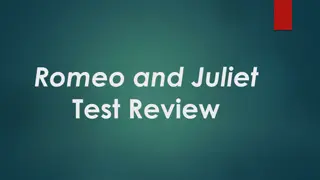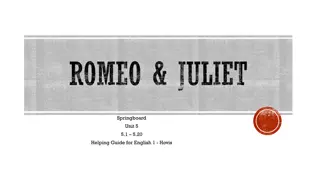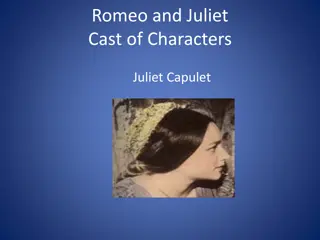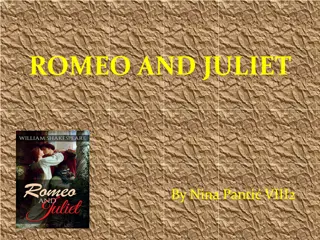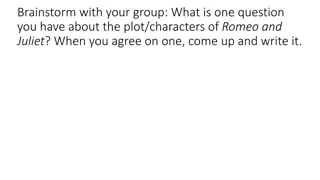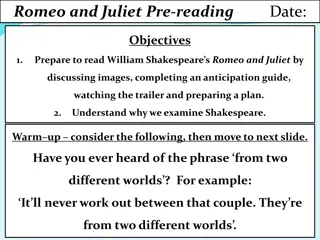Analysis of Conflict and Character Development in Romeo and Juliet Act 3 Scene 1
Act 3 Scene 1 of Romeo and Juliet delves into the escalating conflict between the Montagues and Capulets, showcasing how external factors influence character behavior. The scene unfolds in a public setting, highlighting the shift from humor to tragedy as Mercutio and Tybalt engage in a fatal duel. Through Shakespeare's use of language and structural techniques, the audience witnesses the devastating consequences of hot-headedness and hatred, setting the stage for further turmoil in the play.
Download Presentation

Please find below an Image/Link to download the presentation.
The content on the website is provided AS IS for your information and personal use only. It may not be sold, licensed, or shared on other websites without obtaining consent from the author. Download presentation by click this link. If you encounter any issues during the download, it is possible that the publisher has removed the file from their server.
E N D
Presentation Transcript
Starter What can you remember? What happens between Act 1 scene 1 and the end of Act 2 of Romeo and Juliet? Tell me what you can remember don t write down anything yet! Look carefully at the plot sheet. Summarise what happens in about 100 Words.
Act 3 Scene 1 Let s read the scene together. Pay close attention to how conflict is presented in the scene? Identify any language, structural or dramatic techniques used by Shakespeare to highlight the conflict.
Looking closer Benvolio (again the peace maker) - 'let's retire: The day is hot... these hot days is the mad blood stirring'. What do you think is the significance of this line? This line reflects some beliefs in Shakespeare's time, that when the days were hot, people would get hot headed, becoming animalistic and slip down the hierarchy of being. This mirrors Shakespeare's beliefs that conflict is degrading. The use of personification creates a number of effects. Firstly, the word 'mad' further highlights the beliefs that when it was hot, you could lose your mind. Additionally, it suggests how insane conflict is and how 'mad' it is to shed blood because of a petty grudge. It also suggests loss of control, of both mind and body, showing how easy it is to get carried away by conflict.
Ideas (AO1) and Techniques used (AO2) Act 3 opens in much the same way as Act 1 scene 1. It is a public place as per the stage directions and the early interchange is some what comedic. Furthermore, the hopeful tone of Act II changes dramatically at the beginning of Act III as Romeo becomes embroiled in the brutal conflict between the families. Structurally these two aspects are effective in lulling the audience into a false sense of security. The audience might imagine that the fighting would end the same way as Act 1 scene 1. The deaths of, first Mercutio, and then Tybalt are shocking and emphasise the horrific nature of the conflict.
Consider origins of the name Mercutio. How aptly is he named, considering the dictionary definition of the word mercurial? What s in a name? mer cu ri al adjective 1. changeable; volatile; fickle; flighty; erratic: a mercurial nature. 2. animated; lively; sprightly; quick- witted. Watch act 3 scene 1 of Zefferelli dvd from beginning (01.07.56) to Mercutio s death (01.18.00) What does he do/ say which reinforces the description of the word/ name? Considering his actions, words, behaviour. How is the movement on screen echoed in the structure of the text? (Balletic movement/ fencing Tybalt and Mercutio dance around each other literally and metaphorically through their words.)
Mercutio is a fictional character and does not appear in the story and poem that Shakespeare based this play on. Mercutio, Romeo's quick-tempered, witty friend, links the comic and violent action of the play. He is initially presented as a playful rogue who possesses both a brilliant comic capacity and an opportunistic, galvanised (shocking) approach to love. Later, Mercutio's death functions as a turning point for the action of the play. In death, he becomes a tragic figure, shifting the play's direction from comedy to tragedy. Mercutio's name is derived from the word mercury , a fiery unpredictable element, mirroring Mercutio's fiery unpredictable personality: "by my heel I care not." The line reveals how Mercutio acts with his heart, making him a loveable character but his personality is conflicting to that of Benvolio's, "by my head. His lack of understanding about love is important as he is ignorant of Romeo s true feelings about Juliet and marriage when he dies in Act 3 Scene 1 Mercutio
Mercutios death Mercutio's final speech employs dark comedy to illustrate the tragic significance of the latest violence. Mercutio dies frustrated and angry shocked and in disbelief that his fate is upon him. Until and even in the midst of that moment, his ignorance of the underlying forces that brought him to such an untimely end provides much of the ironic humor for the play. He repeatedly curses, "A plague o' both your houses." Even his characteristic wit turns bitter as Mercutio treats the subject of his own death with humorous wordplay: "Ask for me tomorrow and you shall find me a grave man." In the final irony of this scene, Mercutio never learns for what cause he was wounded. He believes he is wounded for a fight, not for a love. In shocked disbelief, he asks Romeo "Why the devil / came you between us? I was hurt under your arm."
Point Evidence Language What this shows about the character of Mercutio? This indicates he doesn t respect or fear the authority of the Prince. Mercutio is has no fear of the feud. I will not budge for no man's pleasure, I. When he says I will not budge it shows his determination to stay. When he says for no man s pleasure he is referring to the Prince who has made clear that no more fights must occur. Mercutio is...? Consort? What, dost thou make us minstrels? The two questions suggest that Mercutio purposely misunderstands what Tybalt means. Consort has two meanings: friends/ companions or a group of musicians so he tries to twist Tybalt s words to make it sound like Tybalt is being rude. This connotes
Point Evidence Language What this shows about the character of Mercutio? Mercutio is has no fear of the feud. I will not budge for no man's pleasure, I. When he says I will not budge it shows his determination to stay. When he says for no man s pleasure he is referring to the Prince who has made clear that no more fights must occur. This indicates he doesn t respect or fear the authority of the Prince. Perhaps, because he is a relation to the Prince, he feels safe from his punishments. Alternatively, he could be so confident in his ability to take on the Capulets that he doesn t feel the need to run away. This connotes Mercutio does this to try to provoke Tybalt because he enjoys arguing and sparring, particularly with Tybalt, who is a Capulet his enemy. Mercutio seems to find sport in toying with others and causing mischief. Mercutio is quick witted Consort? What, dost thou make us minstrels? The two questions suggest that Mercutio purposely misunderstands what Tybalt means. Consort has two meanings: friends/ companions or a group of musicians so he tries to twist Tybalt s
Point Evidence Language What this shows about the character of Mercutio? Mercutio is ..? o, calm, dishonourable, vile submission! This helps the audience to understand that
Point Evidence Language What this shows about the character of Mercutio? Mercutio is committed to the feud. o, calm, dishonourable, vile submission! The list of three adjectives used by Mercutio to describe Romeo s refusal to fight Tybalt are extremely negative. This helps the audience to understand that Mercutio believes that Romeo should fight Tybalt for honour, whether he wants to or not. The fact that he refuses makes Mercutio feel disgusted.
Why is it important that Mercutio dies? Consider: What he is like as a character What the audience think/ feel about him What happens as a result of his death
The significance of Mercutio and his death Mercutio is a Joker who is quick witted and provides light entertainment and humour, he is therefore liked by audience. His death, coming immediately after the wedding changes the atmosphere from positive to negative. His death results in the death of the humour. This reminds the audience of the events foretold in the prologue. And, in fact, his death is the pivotal point in the play; the tragic events (as promised) begin with his death, pick up pace and begin to spiral out of control. It is his death which leads Romeo to kill Tybalt in revenge who is then banished, which leads to and so on. For Romeo, this follows the expectations of an Elizabethan audience and their belief of the wheel of fortune the abrupt change of fortune of a character as a result of the inevitable turn of the wheel. (like the de casibus tragedies moral tales where characters fall from the height of happiness).
... peace! I hate ... peace! I hate the word the word Tybalt is Juliet s cousin and, as the eldest male, heir to the Capulet legacy. He takes the feud seriously, seeing it to be as much his birthright as the family fortune. Tybal t He hates Romeo, heir to the Montague throne , and sees it as a personal slight that Romeo gate- crashes the Capulet celebrations. He is further enraged by, his uncle, Lord Capulet s command to ignore Romeo s presence, calling him, Romeo, a virtuous and well-govern'd youth .
http://t1.gstatic.com/images?q=tbn:tedZBznTt1JjYM:http://www.huffenglish.com/danahuff/images/tybalt1.jpghttp://t1.gstatic.com/images?q=tbn:tedZBznTt1JjYM:http://www.huffenglish.com/danahuff/images/tybalt1.jpg As evident in Act One Scene One, Tybalt is hot-tempered and quarrelsome. In Act Three Scene One, Mercutio calls him Prince of Cats . What character traits does this suggest?
This is partly a compliment: cats are lithe and agile, a reference to Tybalt s swordsmanship. But, as per the continuing theme of appearance and reality, there is a less flattering reading to Mercutio s nickname. Like Tybalt, cats are considered finicky, predatory and territorial creatures. At the time Shakespeare was writing they were also often superstitiously linked to witchcraft and evil. Mercutio is mocking Tybalt for sharing his name with a character from an earlier fable, the cat in Reynard the Fox . He knows this will wind him up, as, like the cat in the fable, Tybalt is easily irritated.
